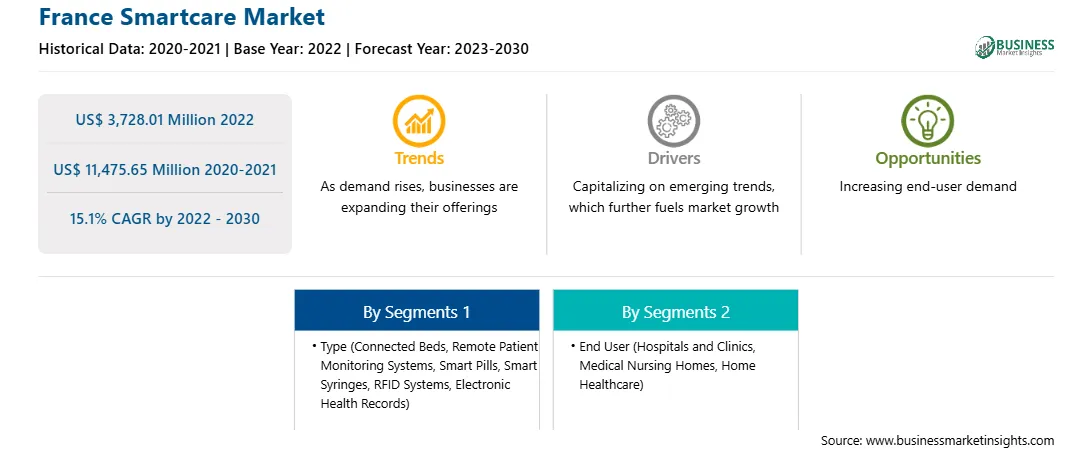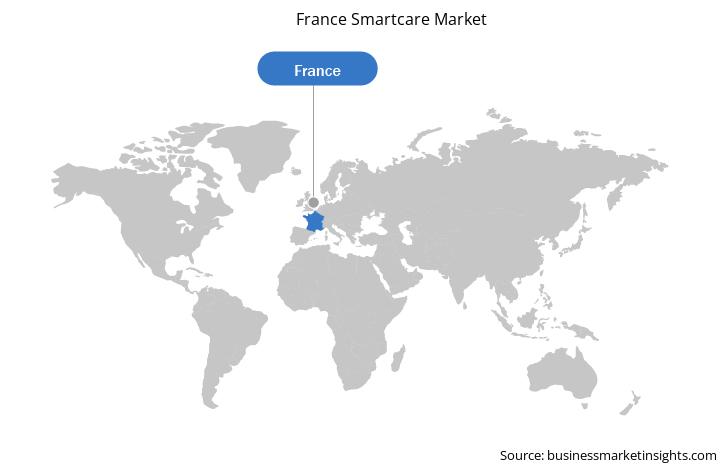The France smartcare market size was valued at US$ 3,728.01 million in 2022 and is expected to reach US$ 11,475.65 million by 2030; it is estimated to record a CAGR of 15.1% from 2022 to 2030.
Key factors driving the France smartcare market growth include the growing penetration of EHR or EMR and medical device connectivity and favorable reimbursement scenario.
Favourable reimbursement scenarios
Telehealth bridges the gap between patients, and physicians and health systems by enabling patients to communicate with physicians through virtual channels remotely. It helps reduce unnecessary visits to hospitals for minor issues. When paired with telehealth services, wearable technology can help care providers study real-time patient data to generate intelligent individualized insights and curate the best treatment plan from the comfort and safety of their homes. Due to the COVID-19 outbreak, there is an increase in the use of telehealth services and wearable technologies that are tagged through medical device connectivity. After the outbreak, virtual consultations are fully reimbursed by the French Social Security. Remote patient monitoring (RPM) is a telehealth program that collects and analyzes patient health or medical data. It has expanded in the past decade and has improved medical outcomes and treatment of noncommunicable chronic diseases. However, implementation of RPM into routine clinical activities has been limited. The Ministry of Health in France introduced a temporary funding program named as ETAPES in 2014. Through this program, healthcare providers and RPM solution providers for diabetes, chronic heart failure, chronic renal failure, chronic respiratory failure, and therapeutic implantable cardiac prosthesis are temporarily being funded. Moreover, the program is a prefiguration for integrating the RPM funding model for routine clinical activities into a model. It was extended till 2022 to encourage the use of innovative technologies in addition to exploring the advantages telemedicine could bring to the French health system. The growing focus of French Government on reimbursement for telehealth and RPM creates awareness about the use of smartcare devices in the healthcare system. Thus, the availability of favorable reimbursement scenario fuels the growth of the France smartcare market.
The shift of point of care (PoC) from hospital to home provides good chances for better, consistent, and timely interaction between patient and doctor, making cloud and mobility-driven medical devices a foremost trend. Also, the COVID-19 outbreak crisis triggered the importance of AI in healthcare, which led to the growing emphasis on home-based care due to limited hospital bed capacity and a scarcity of skilled healthcare professionals. By monitoring the patient's vitals remotely, healthcare professionals can avoid hospital admissions if patients can be treated virtually. As a result, hospitals can reserve beds only for patients requiring critical care. Home monitoring, often known as remote patient monitoring (RPM), has a subset of applications that have different requirements and frequency of data delivery, including monitoring chronic diseases and tracking patients' health status.
Home healthcare provides great prospects for smartcare. Solutions to inefficient, costly, and single-use devices for remote patient care can be provided through connected medical devices that utilize the cloud, Machine-to-Machine (M2M) connectivity, and cellular networks. Connected devices help transfer data to caregivers or clinicians, allowing proactive care delivery. Connectivity in the medical industry improves the quality and efficiency of patient treatments.
The rising numbers of connected medical devices and increasing improvements in the systems and software that support the capture and transmission of medical-grade data and connectivity technologies and services have given rise to the Internet of Medical Things (IoMT). Through IoMT, the connectivity between sensors and devices is expected to aid in real-time patient care, even remotely, thereby improving communication within and between medical facilities. Owing to the aforementioned factors, the market for smartcare is expected to proliferate during the forecast period.
France has long been recognized for its excellence in healthcare, with renowned medical institutions, cutting-edge research, and highly skilled healthcare professionals. According to the World Health Organization (WHO), France ranks sixth globally in terms of investments (public and private) in healthcare. The government of France is focusing on introducing technologically advanced products in its healthcare facilities to become a global healthcare innovation leader in the future. The Health Innovation 2030 plan was launched by the government of France in 2021. As a part of this plan, the government invested US$ 693.46 million ( 650 million) to accelerate the digital health strategy in the country. Thus, the increasing focus of government on digital health initiatives drives the smartcare market growth in France.
Rising product launches of smart wearable devices that can be used for health monitoring by the population and growing use of telehealth and telemedicine applications for consultations boost the growth of the France smartcare market. Furthermore, increasing use of EHR and RPM technologies by healthcare institutions such as hospitals, nursing homes, and clinics for monitoring and managing their patient flow to improve the quality of care and working efficiency of the institution in France also bolsters the market growth.
According to an article published by Business News Daily, an average hospital room contains 15-20 connected medical devices. In a few hospitals, connected medical devices outnumber mobile devices, such as laptops and smartphones, by four to one. Nearly 85,000 connected devices are housed in a large hospital, with each device performing significant roles in delivering care while ensuring operational efficiency. These connected devices are vulnerable to malicious cyberattacks. Therefore, the number of data breaches associated with healthcare information and patient data has been gradually increasing. Healthcare is second only to the finance industry in the number of cyberattacks annually. Recent cyberattacks have shifted the issue of cybersecurity and data risk management centers in front. In December 2022, a hospital in Versailles canceled operations and had to transfer some patients to other hospitals for emergency surgeries due to a cyberattack. Similarly, in August 2022, the Corbeil-Essonnes hospital was also targeted by a cyberattack. Thus, digital healthcare is a lucrative target for cyberattacks and data breaches, with misconfigured cloud storage buckets, weaponized ransomware, and phishing e-mails, which, in turn, restrains the adoption of smartcare.
Type-Based Insights
The smartcare market, by product type, is segmented into connected beds, remote patient monitoring, smart pills, smart syringes, RFID systems, electronic health records, and others. The remote patient monitoring segment held a largest market share in 2022, while electronic health records segment is anticipated to register a highest CAGR of 16.0% during the forecast period.
End User-Based Insights
The smartcare market, by end user, is segmented into hospitals and clinics, medical nursing homes, home healthcare, and others. The hospitals and clinics segment held a largest market share in 2022, while home healthcare segment is anticipated to register a highest CAGR of 15.8% during the forecast period.
A few of the major primary and secondary sources referred to while preparing the report on the France smartcare market are the World Health Organization (WHO), Centers for Disease Control and Prevention (CDC), and National Digital Health Agency (ANS).
Strategic insights for the France Smartcare provides data-driven analysis of the industry landscape, including current trends, key players, and regional nuances. These insights offer actionable recommendations, enabling readers to differentiate themselves from competitors by identifying untapped segments or developing unique value propositions. Leveraging data analytics, these insights help industry players anticipate the market shifts, whether investors, manufacturers, or other stakeholders. A future-oriented perspective is essential, helping stakeholders anticipate market shifts and position themselves for long-term success in this dynamic region. Ultimately, effective strategic insights empower readers to make informed decisions that drive profitability and achieve their business objectives within the market.

| Report Attribute | Details |
|---|---|
| Market size in 2022 | US$ 3,728.01 Million |
| Market Size by 2030 | US$ 11,475.65 Million |
| Global CAGR (2022 - 2030) | 15.1% |
| Historical Data | 2020-2021 |
| Forecast period | 2023-2030 |
| Segments Covered |
By Type
|
| Regions and Countries Covered | France
|
| Market leaders and key company profiles |
The geographic scope of the France Smartcare refers to the specific areas in which a business operates and competes. Understanding local distinctions, such as diverse consumer preferences (e.g., demand for specific plug types or battery backup durations), varying economic conditions, and regulatory environments, is crucial for tailoring strategies to specific markets. Businesses can expand their reach by identifying underserved areas or adapting their offerings to meet local demands. A clear market focus allows for more effective resource allocation, targeted marketing campaigns, and better positioning against local competitors, ultimately driving growth in those targeted areas.

The List of Companies - France Smartcare Market
- Oracle Corp
- Samsung Healthcare
- BodyCap
- GE Healthcare Technologies
- Orme SARL
- AdolfWurth GmbH & Co KG
- McKesson Corp
- Kaspard
- Domalys SAS
- Siemens Healthineers
- MintT
- Groupe WINNCARE SAS
The France Smartcare Market is valued at US$ 3,728.01 Million in 2022, it is projected to reach US$ 11,475.65 Million by 2030.
As per our report France Smartcare Market, the market size is valued at US$ 3,728.01 Million in 2022, projecting it to reach US$ 11,475.65 Million by 2030. This translates to a CAGR of approximately 15.1% during the forecast period.
The France Smartcare Market report typically cover these key segments-
The historic period, base year, and forecast period can vary slightly depending on the specific market research report. However, for the France Smartcare Market report:
The France Smartcare Market is populated by several key players, each contributing to its growth and innovation. Some of the major players include:
The France Smartcare Market report is valuable for diverse stakeholders, including:
Essentially, anyone involved in or considering involvement in the France Smartcare Market value chain can benefit from the information contained in a comprehensive market report.